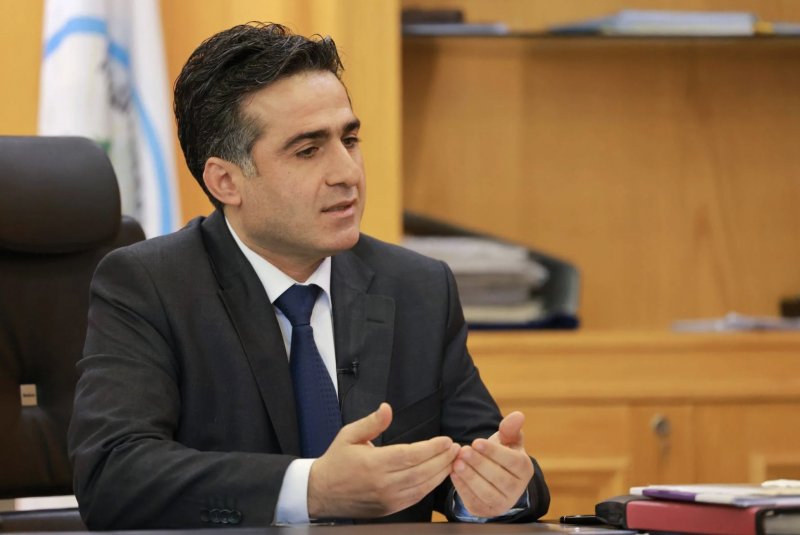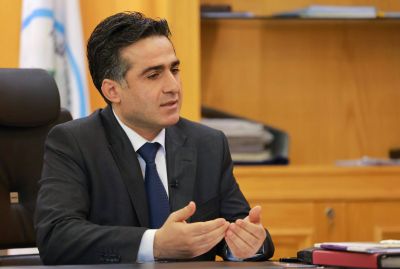
Minister of Transport and Public Works Ali Hamieh. (Photo: AFP)
"The Maronite patriarchate is a national symbol that we respect."
Tensions between Maronite Patriarch Bechara Rai and Hezbollah reached their peak in the wake of the Moussa al-Hage affair, but this statement made from Dimane by the Minister of Transport and Public Works, Ali Hamieh, who is affiliated with the pro-Iranian party, seems to signify a lull in the hostilities.
Although Mr. Hamieh claims to have visited the patriarch's summer residence "in a personal capacity," the visit carries important symbolic value.
Nearly three months after the arrest of Archbishop Moussa al-Hage, the Maronite archbishop of Haifa and Jerusalem, has the dust finally settled?
Hage was arrested July 18 by General Security on orders from the government commissioner of the interim military court, Fadi Akiki, in Ras Naqoura. Hage was then interrogated for 12 hours.
He was released after being stripped of his passport and laptop, as well as medicine and $460,000 in cash sent by Lebanese citizens in Israel to their relatives in Lebanon. Many of these Lebanese had served in Israel's proxy militia, the South Lebanon Army, and sought asylum in Israeli-controlled territory after the end of the Israeli occupation of southern Lebanon in 2000.
Bkerki was quick to denounce the arrest, saying that an archbishop cannot be questioned without referring to his hierarchical authority.
In an interview with L'Orient-Le Jour a few days after the incident, Moussa al-Hage said his “arrest aims to send a strong message to the patriarch.” The arrest came at a time when Bechara Rai is multiplying his criticisms of Hezbollah and his calls to affirm Lebanon's neutrality.
In his homily the Sunday following the arrest, the head of the Maronite Church went a step further in his confrontation with the Shiite party, which went so far as to implicitly accuse Rai of "collaboration."
"Look for the agents elsewhere. You know who they are and where they are," Rai hammered, in a thinly-veiled accusation against Hezbollah of working in favor of Iran in Lebanon and the broader region.
Relationships were never severed
Nearly three months after this affair, Hage was able to recover his personal belongings, but the fate of the money and medicine he was carrying remains unknown. According to information obtained by L’Orient-Le Jour, an agreement was reached for the army to take charge of the distribution of this aid and to ensure the identity of its recipients.
Walid Ghayad, head of communications within the Maronite Church, confirmed this agreement to L'Orient-Le Jour.
"This does not mean, however, that the case is closed," Ghayad said.
A debate is likely to begin soon on the route taken by the clergy between Lebanon and Jerusalem. In a televised speech last July, Hezbollah Secretary-General Hassan Nasrallah called on the Maronite Church to travel through Jordan rather than cross the border at Naqoura. Unlike Lebanon, Jordan maintains diplomatic relations with the Jewish state.
The Church refused this option, however, which it says complicates its travels. The Church said return trips to Israel have been organized since 1957.
While not all disagreements have been resolved, Mr. Hamieh's visit is seen as a positive step by Bkerki.
"Long before the Moussa el-Hage affair, Mr. Hamieh had expressed his desire to visit the patriarch. So we recently invited him to lunch," said Ghayad. “Relations were never broken off, and Hezbollah assures us that it had no connection with Judge Akiki's decision to arrest Bishop el-Hage.”
A week after the arrest of the archbishop, Nasrallah had denied any involvement. "The presumptions of some who think that the Lebanese security organs are working for the benefit of Hezbollah are false, slanderous and unfair to these services and the party," he said.
‘Behind the state’
Some circles of the Shiite party say they want to be conciliatory and open to dialogue.
"Mr. Hamieh's visit came in response to an invitation from the patriarch, which the minister could not refuse, given his respect for Bkerki," confirmed Abu Said Khansa, who is responsible for Hezbollah’s relationship with the Christians. "This visit is certainly a step forward, but it should be noted that the dialogue has never been interrupted. I myself am a member of the dialogue committee between Hezbollah and the Maronite Patriarchate."
Speaking to L’Orient-Le Jour, Said Khansa continued: "Everyone knows, including Bkerki, [that] no one can afford to cut ties with anyone in Lebanon.” However, Mr. Khansa denied that the visit is related to the case of Archbishop al-Hage.
"In this case, Hezbollah is standing behind the Lebanese state," he said.
This is also the opinion of Kassem Kassir, a well-known analyst close to the circles of the Shiite party.
"Hezbollah supported Mr. Hamieh's visit to Bkerki in order to maintain good relations with all parties in Lebanon," he said.
This is all the more important for Hezbollah as the end of President Michel Aoun's term of office approaches. Aoun’s mandate ends Oct. 31 and the race to elect his successor is underway.
The patriarch will certainly have his say in the outcome of the election, as the responsibility lies with the Maronite community. But Hezbollah does not want a battle for a candidate, as it did with Aoun in 2014 and 2016. It wants the election of a consensus president, rather than a figure who is hostile to the party.
Bkerki, however, said they did not discuss the presidential issue with Minister Hamieh. "The discussions were mainly about the work of his ministry, as well as general issues," said Ghayad.
This story was originally published in French in L'Orient-Le Jour.
